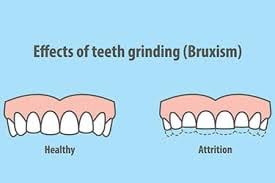
There is a lot on our to-do list when getting ready for bed. A lot of time we focus on the type of mattress, bedding, and pillow we use. Add in a sleep mask, essential oils, and darkening curtains you may think the list is complete.
However, brushing your teeth and taking care of your mouth is an equally important task when our saliva slows down in REM. “During sleep, saliva production increases which helps neutralize acid produced by bacteria in the mouth and wash away food particles. Saliva also contains minerals like calcium and phosphates which help strengthen tooth enamel and reduce cavities.” When we sleep, swallowing may slow down which can increase bacteria build-up as well.
A lot is going on with our body when we sleep!
Dr. Kian Singh Dhinsa said high stress levels is the most common reason behind bruxism while Dr. Henry Hackney added tooth enamel decay and painful tooth sensitivity as long-term culprits. Acid reflux can erode enamel and jaw pain can create sleep disruptions all leading to cases of bruxism.
“Stress also leads to increased cortisol levels, weakening the immune system and making you more susceptible to bacterial infections such as gingivitis.”
Bruxism, or grinding teeth, diminishes not only your quality of sleep but harms the enamel making your teeth vulnerable to tooth decay. It can also lead to TMJ (temporomandibular joint disorder) which causes migraines, oral numbness or pain, or pinched nerves. Add in any missing teeth and grinding can increase bringing frequent loss of sleep. With obstructive sleep apnea (OSA), bruxism can cause excessive wear, fractures, and damage to your teeth.
Oral Hygiene
The question is: How can I improve my oral hygiene to sustain a healthy body and mind?
- Brush twice a day for two minutes. Using a pea-sized amount of toothpaste, make certain to brush your teeth consistently.
- Search for a dentist. There are many problems available if you need help financially with dental visits. But first, you need to do some research and reach out to local dentists. Preventative care is the best care!
- Use the right tools. For those with eroding gums, a soft toothbrush works best. Circle brushing works best starting from the front to the back of the mouth.
- Floss. Everyone hates to think about picking the junk between your teeth but it leads to fewer cavities and less tartar. Once tartar finds a home in the teeth, it can only be removed by a hygienist or dentist.
- Rinse with mouthwash. Therapeutic mouthwash is designed to strengthen teeth and treat plaque, cavities, and gingivitis. Though it does not remove everything, it is a step towards a healthier mouth.
- Avoid smoking and tobacco products. Studies found patients with dental disease are 16 times more likely to get a diagnosis with a history.
Sleep Devices and Correction
Dental and sleep apnea devices available include a Continuous Positive Airway Pressure machine (CPAP), mouth appliances, and specially designed pillows. Oral treatments include a Mandibular Repositioning device and a Tongue-retaining device. These devices open your airway by bringing your lower jaw forward during sleep. They are acrylic and fit inside your mouth, much like an athletic mouthguard. Others may fit around your head and chin to adjust the position of your lower jaw as well.
Early signs and symptoms are key with bruxism to save the enamel of your teeth and the sleep you are losing. Regular visits to your dentist can help track any issues that may accumulate leading to additional dental diseases.
The American Dental Association requires dentists to include sleep-related screenings during oral examinations to create a successful course of action to help aid their oral hygiene as well.
If you live in Alaska and would like to speak with a sleep educator about your symptoms to determine if a sleep study is right for you, click on the link below to receive a free 10-minute phone consultation.










